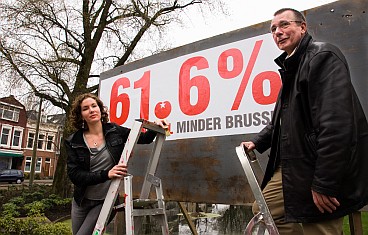'SP offers a unique opportunity: left policies and less Brussels'
'SP offers a unique opportunity: left policies and less Brussels'
A few days ago the daily newspaper Trouw carried a graphic which ranked all Dutch political parties according to two criteria: more or less European integration, and – in social-economic terms – left or right. "This graphic confirmed what we have of course long known," says Dennis de Jong, number one candidate on the SP list for the European elections on June 4th . “The SP has a unique message. We are the only ones to combine less Brussels with left social-economic policies. The only ones! That means that if, as a voter, you say to yourself 'I want a humane and socially progressive policy without Brussels' neoliberal interference', then you can really only vote for one party, and that's the SP."

SP candidates Jessica van Ruitenburg and Dennis de Jong putting up the first SP posters of the campaign
"Four years ago the referendum on the European Constitution provoked fierce discussions in the streets. 61.6% of the electorate voted against. Were all of these people europhobes who wanted us to get out of the European Union as soon as we can? Of course not. Everyone knows very well that until the 1990s European cooperation worked well. Intensive cooperation between France and Germany ensured more stability in Europe and there were no more wars between member states. The abolition of import tariffs between the member states brought more prosperity. In that period it was a matter of sincere and transparent cooperation between like-minded countries.
"At the beginning of the 'nineties this cooperation underwent a change, however. The internal market must be deepened. In practice this meant that the principle of 'fair competition' would come to determine everything. The neoliberals in Brussels found this an excellent means to undermine social rights in Europe: the fewer such rights for workers, the better it would be for the economy, that was their thinking. Brussels fell prey to lobbyists from major corporations: directives and regulations issuing from Brussels – and there are many – were increasingly dictated by the interests of these firms.
"Brussels meddles in very many aspects of our everyday lives, but we have no control over it. And so we voted en masse against the European Constitution. Now, four years later, the same voters can see that the government is, despite this, in agreement with the new treaty, the Lisbon Treaty, which contains all of the elements of the Constitution. We can settle this account on June 4th."
- See also:
- European Elections 2009
